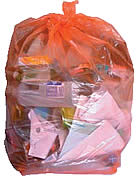H&F Residents Are The UK's Third Greenest
Experian report shows nearly 60% are 'eco-evangelists'
More than half of Hammersmith and Fulham residents are 'eco-evangelists', according to a new survey by Experian.
The survey shows that 57.4% of residents are environmentally aware, the third highest figure out of all boroughs in the country.
Experian divided people into ten categories, ranging from 'eco-evangelist' to 'wasteful and unconvinced'. 'Eco-evangelists' tend to be well educated, have high incomes and know a lot about carbon off-setting, but are reluctant to give up their luxuries and are frequent fliers.
At the other end of the scale, those in the 'wasteful and unconvinced' category are mostly on low incomes, tend to live in social housing and tend to think environmental concern involves sacrifice, according to Experian. However, they are more likely to use public transport and generally don’t fly more than once a year. Only 10.42 percent of Hammersmith and Fulham residents are in this category, compared to 34 percent in the top scorer, Tower Hamlets.
Other categories include ‘confused but well behaved’, ‘too busy to change’ and ‘why should I bother?’
Martin Wheatley, the Local Government Association’s programme director for environment and planning, said social background was often a factor when it came to issues such as recycling. “It’s difficult to get people who are marginalised to focus on environmental issues,” he told the Local Government Chronicle. “Councils will have to try to understand more about the residents who fall into this group, and lead by example.”
The report also measures the total carbon emissions per household. Hammersmith and Fulham is placed slightly more than halfway down the list of 434 local authorities. Mark Pestereff of Experian said keen recyclers were not necessarily enthusiastic when it came to other types of green behaviour: “What we’ve found is that some of the eco-evangelists tend to have some of the highest CO2 emissions,” he said. “You would think that they would be using less, but they are big producers.”
1 December 2009
Related links
|
